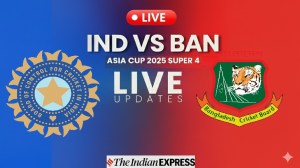Bofors to Cola,JPC tool rarely used
Is a JPC an easy escape route for a ruling coalition or an effective tool for the Opposition to turn the heat on the govt?
The sight is similar,only the players have undergone a role-change. In 2001,the then finance minister Yashwant Sinha was in the eye of a storm following the market scam. The issue subsided once the government set up a joint parliamentary committee to probe it. Today,he is on the other side,demanding a JPC to inquire the affairs of the Indian Premier League (IPL).
Leader of the Opposition Sushma Swaraj,the then Minister for Health and Parliamentary Affairs proposed a JPC to on the floor of the House as the issue of the presence of pesticide residues in soft drinks triggered a heated debate in August 2003. Interestingly,Sharad Pawar,who heads the BCCI now,was then named head of the JPC.
So,is a JPC an easy escape route for a ruling coalition or an effective tool for the Opposition to turn the heat on the government?
Former secretary-general of the Lok Sabha Subhash Kashyap says it is difficult to say with certainty because of various possibilities. After all,politics determines the conduct of politicians,he says. A JPC has only a recommendatory role though it can summon any document or person.
There have been only four investigative JPCs so far. The first was instituted to inquire into the Bofors contract on a motion moved by then Defence Minister K C Pant in the Lok Sabha on August 6,1987. The Rajya Sabha endorsed it a week later. The committee,headed by B Shankaranand,held 50 sittings and gave its report on April 26,1988.
The second investigative JPC was mandated to probe Irregularities in Securities and Banking Transactions on a motion moved by the then Minister for Parliamentary Affairs Ghulam Nabi Azad in the Lok Sabha on August 6,1992. The Rajya Sabha concurred with it the next day. The committee,presided by former Union minister and Congress leader Ram Niwas Mirdha,gave its report after six sittings on December 21,1993.
The third investigative JPC was assigned to probe the market scam. The then Parliamentary Affairs Minister Pramod Mahajan piloted a motion in the Lok Sabha on April 26,2001 to put it in place. Senior BJP member Lt Gen Prakash Mani Tripathi (retd) was named the chairman. The issue of the suspension of redemption from US 64 fund by the Unit Trust of India was also referred to it. The committee held 105 sittings and gave its report on December 19,2002.
The last JPC was set up in August 2003 to look into pesticide residues in and safety standards for soft drinks,fruit juice and other beverages. The committee held 17 sittings and submitted its report to Parliament on February 4,2004.
Asked if he considers the JPC an effective instrument for probing a scam,Tripathi said: A JPC can do an effective job if it is not politicised.
CPI leader Gurudas Dasgupta,who was a member of the JPC which went into the irregularities in securities and banking transactions,said,I think a JPC is a very vital mechanism for getting to the bottom of a scam.
Photos



- 01
- 02
- 03
- 04
- 05




























